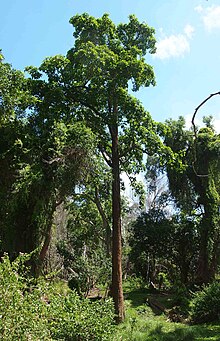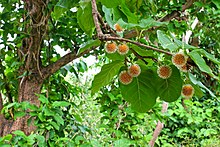Nauclea orientalis
| Leichhardt tree | |
|---|---|
 |
|
| Leichhardt tree from Rockhampton, Queensland | |
 |
|
| Leichhardt tree from Gregory National Park, Northern Territory | |
| Scientific classification | |
| Kingdom: | Plantae |
| Clade: | Angiosperms |
| Clade: | Eudicots |
| Clade: | Asterids |
| Order: | Gentianales |
| Family: | Rubiaceae |
| Genus: | Nauclea |
| Species: | N. orientalis |
| Binomial name | |
|
Nauclea orientalis (L.) L. |
|
 |
|
| N. orientalis distribution map. | |
| Synonyms | |
|
List
|
|
Nauclea orientalis is a species of tree in the Rubiaceae family, native to Southeast Asia, New Guinea, and Australia. It has many common names, including bur tree, canary wood, Leichhardt pine and yellow cheesewood. It grows to a maximum of around 30 m (98 ft) in height and has large glossy leaves. It bears spherical clusters of fragrant flowers that develop into golf ball-sized edible but bitter fruits. The yellowish to orange soft wood is also used for timber and in woodcarving and folk medicine.
Nauclea orientalis is known by the common names Leichhardt tree, cheesewood, yellow cheesewood, and canary cheesewood. It is also sometimes known as the Leichhardt pine due to the overall shape of the tree, though it is not a conifer. "Leichhardt pine", however, is more commonly used for the kadam or burrflower tree (Neolamarckia cadamba), a closely related species. The two were often confused together, but the native range of Leichhardt trees do not extend to India where kadam trees are common. It is known chiefly as bangkal in the Philippines. Regional variations of the name include balikakak, kabag, kabak, mabalot, and malbog. It is closely related and sometimes confused with the bongkol or bulubangkal tree (Nauclea subdita). It is called kanluang in Thailand.
Among the Djabugay people of Australia, they are known as gadugay. Among the Kuku Yalanji, they are known as kabal. The Jawoyn people call it jirrib or wowerlk. In various other languages of the Indigenous Australians, the names for Leichhardt trees include kaapi or kalpi in Pakanh, atulwanyj in Uw Oykangand, atulganyj in Uw Olkola. In avoidance speech (Uw Ilbmbanhdhiy or "respect language"), it is known as oboy in Uw Oykangand and opoy in Uw Olkola.
...
Wikipedia
